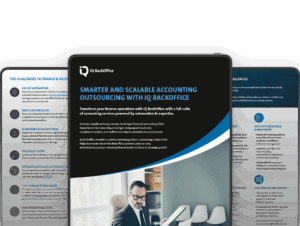Finance and Accounting Automation and Outsourcing – A Closer Look
 Finance and accounting outsourcing is an arrangement whereby a business engages an external party to assume some or all parts of its finance and accounting functions. The outsourcing arrangement can cover a specific function, e.g., data entry up to replacing the entire operation. For instance, business function areas that are often outsourced include accounts payable, accounts receivable, bank reconciliation, financial statements preparation, budgeting, cash flow management, taxation filing, payroll processing, and more.
Finance and accounting outsourcing is an arrangement whereby a business engages an external party to assume some or all parts of its finance and accounting functions. The outsourcing arrangement can cover a specific function, e.g., data entry up to replacing the entire operation. For instance, business function areas that are often outsourced include accounts payable, accounts receivable, bank reconciliation, financial statements preparation, budgeting, cash flow management, taxation filing, payroll processing, and more.
Does Finance and Accounting Automation and Outsourcing Make Sense for Your Company?
Because accounting duties include many low-value transaction-laden activities, outsourcing and automation are viable alternatives to supporting an entire accounting department in-house. The cyclical repetitive nature of many accounting duties makes automating at least a good portion of its operations an ideal choice. Companies can already save a significant amount in costs by reducing the number of full-time employees that must also be trained and supervised by senior managers.
Relieving a company of its more labor-intensive low-value tasks that can be done elsewhere – and in a more efficient manner – would at the very least cut costs and time spent on recruiting, evaluating, hiring, training, and managing full-time employees along with all the related overhead costs associated with staffing. Fees paid to the outsourcing provider, ultimately result in much lower costs than dedicating an accounting division to function as part of the business entity.
Why Do Companies Outsource Their Accounting Processes?
There are several reasons businesses outsource their finance and accounting functions. Let’s take a look at just a few:
- Accounting is not a core competency of most organizations: organizations relying on the expertise of a business processing provider to perform specific business operations more efficiently while meeting the required statutory obligations so that the in-house employees can improve their focus on the core activities of the business
- Gain access to best practices and innovative technologies: since the outsourcing company is performing these functions as its core competency, it has generally invested in best practice processes and technologies out of reach of all but the largest companies
- Improve performance: outsourcing companies are generally held to a much higher standard of performance than an internal department, and often achieve much higher levels of quality and timeliness
- Reduces risk and uncertainty and increases business reliability and redundancy, which has proven itself in 2020 during the Covid pandemic
- Provides flexibility and scalability for rapid growth: Companies going through rapid changes, such as mergers and acquisitions, can streamline their transition while cutting costs
- Cost savings: Organizations typically save 30% to 75% of costs
How can IQ BackOffice Help? Learn about our Accounts Payable service and our full range of outsourcing services.
Read More about this topic:
Accounting Outsourcing – Top 5 Rookie Mistakes
Outsourcing Accounting Processes – Does It Actually Save Money?







